Introduction
Raise your hand if you’d like to improve your digestion… 🙋🏽♀️ This week on The Goodness Lover Podcast, we had the chance to speak with Dr. Wendy Romig, DCN, about how we can optimize and improve our digestion, how to reduce and treat acid reflux, constipation, bloating, how to get the most out of our food sources, and so much more! 👩⚕️
Watch the Interview:
Dr. Romig explained:
🎈 The importance of decreasing inflammation and stress in relation to the digestive system.
📝 What a food assessment protocol to promote healthy digestion looks like from Dr. Romig.
💊 How acid blockers and medications can damage the microbiome if taken for too long.
💦 Why proper nutrition impacts the movement and motility of your gut.
🏃 How to promote peristalsis or the movement of food in the digestive tract.
☕️ How bitter tonics with herbs can increase hydrochloric acid to promote digestion.
And much more that can promote healthy digestion! 🎙
Additional Resources
To connect with Dr. Wendy Romig and discover more of her work, you can find her on Instagram and Facebook. You can also visit her website here.Transcript
Sarah: Hello and welcome back to the Goodness Lover show. Today we're joined by Dr. Wendy Romig who's here to tell us all about how we can optimize and improve our digestion. So anyone with acid reflux, constipation, bloating, or anyone that just wants to get the most out of their food, pay attention. You'll get a lot out of this episode. Let's get into it.
Well, we are very, very privileged to have Dr. Wendy Romig here today to talk to us all about how to optimize our digestion and overcome digestive insufficiency. So thank you so much for joining us, Dr. Wendy.
Dr. Wendy Romig: Thank you so much. It's a pleasure to be with you both again.
Sarah: We always love talking to you, Dr. Wendy, because you're always so full of experience. I love that being a doctor of clinical nutrition, you just understand the power of food to really nourish us and improve our health. And also you've got a wealth of training in herbs and natural remedies, so we love always hearing about all of those. So we're super excited to get into it.
Sarah: But do the topic of today, talking about digestive insufficiency, I guess rather than me explaining what we mean by that, I think it would be best just jump straight over to you. So when we talk about that, who are we talking to? What are we talking about?
Dr. Wendy Romig: Yeah. Digestive insufficiency is something that can be seen across any age. There are so many symptoms that can roll up to digestive insufficiency. And what do we really mean by digestive insufficiency? And it's really just your digestive function isn't working up to par. And in Eastern terms, you might say the fire is not burning strong enough. This is an Eastern way of looking at it, is that fire in the gut.
Your gut's not burning fire enough, it's not strong enough, it's not bringing all of those important chemicals to the mix, it's not bringing those enzymes into the mix. And so then you might be ending up with certain conditions like GERD or SIBO, constipation, gas and bloating, or some of the symptoms that can go along with those things.
The digestive insufficiency can lead to so many other conditions, that are related to poor nutrient absorption and breakdown. And that can be anything from anemia to poor bone health, thyroid conditions, autoimmune conditions. So there's just so many things that roll up to whether or not our gut is firing on all cylinders. And we want to really try and make sure our gut is doing what it needs to be doing, as full of strength as we can.
Matt: Awesome.
Sarah: So important.
Matt: So I guess we could start with maybe one of the biggest ones, which at least from my very basic understanding, we know that... I think that acid reflux is one of the most prescribed medicines out there in the world for-
Sarah: PPIs.
Matt: Yeah. For gut issues in general, or people think, "I've got reflux all time." They're just thinking, "Okay, give me a pill. I need to fix that." So what's really happening with reflux, for example? Is that some form of digestive insufficiency?
Dr. Wendy Romig: It can be. Oftentimes people will have symptoms of reflux. They will either, after a meal, feel things start to push back up. In Chinese medicine, it's actually called rebellious chi, meaning the energy's going the wrong way. Our digestion should be going down. But if the things are pushing back up again, that's definitely rebellious chi and that's the wrong way for digestion.
So what can end up happening is that in an insufficient setting, if we don't have enough hydrochloric acid, we don't have enough of the enzymes that our body needs to be producing, the stomach gets stuck. Because it has all these things coming in, these food constituents coming in, and it doesn't have the energy to be able to break them down.
It's like putting a big log on a fire that's just burning a tiny little spark. The fire's just going to go out and the log's going to just sit there. So if we have a whole meal that's coming in and we don't have enough hydrochloric acid to break it down, we're going to just have the meal sitting there.
So for some people, what they may experience after a meal is they experience their food pushing back up again, because the stomach is just... it sits there and it's not going down. It's not releasing the proper enzymes and hormones and neurotransmitters sufficiently to release everything into the small intestines.
So people that have GERD oftentimes will go to their doctor, or have reflux will go to their doctor and they'll get diagnosed as having GERD or having acid reflux syndrome. And typically what the doctors will do is they will say, "Well, acid is bad to have it being pushed up back into the esophagus, because that does bring risk for esophageal cancer or Barrett's esophagus, which is a condition for some people that have GERD, which means there's a lot of inflammation in the esophagus and potentially could lead to carcinogenic cells developing or malignant cells developing from the carcinogens coming back up.
So when the reflux is happening, they will give what's called a PPI, Proton Pump Inhibitor or an acid blocker. And that's the most conventional drug given. I think that it's probably one of the more prescribed drugs out there, especially for gut indications. And it will be prescribed by a GI doctor or a family medicine doctor. They typically will just give it out to say, "See if this helps your symptoms."
And it will, for a period of time. However, the symptoms tend to start coming back again for some people, because without that hydrochloric acid in the mix, you're still going to get things pushing back up. And what PPIs do is they actually decrease hydrochloric acid. So we could potentially be making the situation worse.
Now, there are some people that, that just have excessive amounts of hydrochloric acid. And those are people that between meals are just burping up acid. I mean, for no good reason, there's just acid coming up. It's called hyperchlorhydria. It's not nearly as common as hypochlorhydria.
So this is the kind of clinical setting that I might see something like this coming in where people will come into me saying they've been diagnosed with GERD or reflux, saying they've had these symptoms of reflux after a meal. And then we're going to start diving down a little bit to see what else is going on.
Sarah: Well, well said. I think it's important that we just highlight that point again, that I think for a lot of people or that have acid reflux, there is the assumption that there's too much acid and what you're saying there is actually, most of the time it's too little acid. Unfortunately when we go on these medications actually can soothe the issue, but it doesn't solve the problem and potentially can make it worse over time.
Sarah: So what would you see, say as being outside of, I guess, the obvious reasons, but what would be the downfalls of being on these PPIs or acid blockers for a long time?
Dr. Wendy Romig:Yeah, there's a lot of research coming out. That's showing, being on these acid blockers, there's so many; omeprazole, pantoprazole, the ozoles in those category. They long term usage of those can really lead to a lot of nutritional deficiencies and it can also cause a lot of damage to the microbiome.
So if you think about what the stomach acid is actually doing, stomach acid, hydrochloric acid is actually activating an enzyme called pepsin. Pepsin is responsible for cleaving off the protein from minerals that are coming in. When minerals come in through our food, they're usually attached to a protein and then the pepsin enzyme will break the protein off of the mineral and mineral can go into the small intestines and become absorbed and go into the bloodstream for absorption.
However, if you have low stomach acid, if hydrochloric acid is low, now you're not getting that protein cleaved off of the minerals as easily and maybe not at all. So now you're not getting calcium, you're not getting iron, you're not getting magnesium. And so here's where you're going to start seeing things like osteoporosis, anemia, it also can affect B12.
B12 absorption is also happening due to acidity in the gut. You have something called intrinsic factor, which has a carrier that helps carry B12 all the way down into the middle part of the small intestines. So we really need that acidity in the stomach to be able to have these nutrients prepared in order for proper absorption.
And the other thing too is because of low stomach acidity, our gut acidity is our one of the first, not the first, but is one of the first layers of immune defense against pathogens on our food. So if you are eating food, there's bacteria everywhere. I mean, we're in a world where there's bacteria. There's bacteria on our bodies, there's bacteria on our foods.
If we don't have sufficient stomach acid to kill that bacteria off, we're now then exposing ourselves to pathogens and non-commensal bacteria, which can really wreak havoc in the gut causing inflammation leading to things like SIBO, which is Small Intestinal Bacterial Overgrowth, SIFO, Small Intestinal Fungal Overgrowth, and then you're getting a whole host of imbalances in the body, which can spiral off into all kinds of conditions that probably outside of today's talk.
Sarah: Yeah, right.
Matt: Wow. And so we opened up a-
Sarah: A lot, it's important.
Matt: Pandora's box right there.
Dr. Wendy Romig: Pandora's box. Yeah.
Matt: So if someone's coming into your clinic presenting with these symptoms, what are some of the protocols you walk them through first?
Dr. Wendy Romig: Sure. First of all, I'm going to just get a basic health history on them to see when did this start. And for some people they just have constitutional low stomach acid. I mean, I have people that have presented with low stomach acid since they were kids. And it might be just that constitutionally, they just have weak digestion.
And in the system of medicine from India called Ayurveda, which a lot of people are familiar with, there are three basic constitutions. There's Vata, Pitta and Kapha. And Vata constitution is a very common constitution. It's the constitution that tends to be thinner framed, more prone to anxiety, tend to not digest their food as well. So they tend to be more pro to digestive insufficiency, constipation, dryness, things like that.
So I see these constitutions coming into my clinic and I can identify them when they come in, they sit down, I'm like, "Okay, this looks like a Vata imbalance, which is that air imbalance, that dryness, that insufficiency imbalance that I'm going to see coming in." And so when I start getting their health history and asking them, "When did this start?" It doesn't surprise me when they say, "I've had these issues since I was a kid."
And so from that, we're really looking to, again, add more fire. We're trying to help them with the types of meals that they're eating. We're going to increase bitter foods in their diet. Maybe give them a bitters compound. I have a compound through Herbalist & Alchemist, and that is a little plug, but they're a really great company.
They do a wonderful bitters compound that has the right blend of herbs for dealing with digestive insufficiencies that can help stimulate hydrochloric acid and also stimulate enzyme production, which in turn then improves digestion. It improves motility because also constipation is a common issue that does come with low stomach acid. So we're looking to check their diet, make sure they're not eating super heavy meals. Heavy meat meals can really bind and cause the stomach also to get stuck. It's like putting a wrench in the gear. A big steak in someone's diet when they don't have much stomach acid is really going to jam up the works.
So we want to think about lighter proteins, lighter foods. We want to think about the bitter foods, like arugula and broccoli rabe, things like that, that are going to stimulate that making sure they're not drinking much water with their meals because a lot of water consumption with meals actually dilutes the acidity in the stomach. So we want to make sure just a few sips of water, not much water after the meal for a half hour, and that will help with digestion as well.
So there's so much of a nutritional component plus, like I said, herbal medicine. For really extreme cases, I might throw a betaine HCL into the mix, but I don't like to use that too often. Same thing with digestive enzymes. I might throw digestive enzymes in for a little bit, but I'm really careful. And there's a term endogenous and exogenous. Exogenous is things that come from the outside in. Endogenous are compound body should be making on its own.
And hydrochloric acid and digestive enzymes are both endogenous compounds that your body should be creating on its own. When you put something from the outside in, which is exogenous, coming in from the outside and replacing them, you run the risk over long term, blunting your body's natural abilities reduce those compounds. So I tend to lean into herbs a lot more.
My background is herbal medicine plus the functional medicine and nutrition side, but I really love the herbs' ability to just stoke the fire as opposed to replace. So those are some general guidelines and protocols that I will bring into the mix for someone that has these kinds of symptoms.
Sarah: Awesome. I'd love to talk about the bitter tonic for a second there. So you mentioned a specific one that you use. I'm curious, is this used as a spray before a meal or do you drink it because I guess I'm curious to know how much it can actually help. Because I guess before having a meal, you spray something in your mouth, potentially. I don't know what form it comes in.
Dr. Wendy Romig: Tincture. Mm-hmm (affirmative).
Sarah: Yeah, yeah. Right. And it just seems so small, but can it make such a big difference? What have you seen? How does that work? How can something so like minuscule make such a big difference?
Dr. Wendy Romig: Yeah, it makes a huge difference. This form is in a tincture and it's a blend of artichoke leaf, angelica, dandelion, there's a couple of others in there. There's a little bit of mint in there but just a tiny bit. And so there's a lot of bitter herbs that are blended together for this compound.
The key to this bitters compound is that it does not have senna in it. So one thing to note that people might get Swedish bitters and think that's okay, but Swedish bitters do have senna in them for bowel motility but I don't recommend that. And we can go into that in a minute, but to answer your question, yes, a little bit can go a long way because herbs in tincture form are extremely potent.
So a half a teaspoon, a quarter of a teaspoon, I tend to dose out in teaspoons here, because it's a little bit easier for folks to understand that measurement, but a quarter to a half a teaspoon in a little bit of water before a meal can really do a lot to increase the release of hydrochloric acid and to release enzymes.
And for some people I even suggest trying after the meal just to bring motility on a little bit faster. Most of the time I recommend it as a before meal remedy. However, sometimes I say for the first couple weeks, do it before and after the meal, quarter teaspoon before, quarter teaspoon after, just to see if we can induce a little bit of increased motility, getting things flowing, and then they can back off of it.
Sarah: That cool.
Dr. Wendy Romig: It does make a huge difference though. Yeah. But the sprays, I don't know. I mean, it just depends on the herbs. It's all about the formulation, which is why I'm so picky.
Sarah: Okay. Great. What was the name of the brand that you personally use with your clients? Dr. Wendy Romig: It's Herbalist & Alchemist.
Sarah: Okay. Cool.
Dr. Wendy Romig: And it's the traditional bitters compound.
Sarah: Awesome.
Matt: It's a cool brand name.
Sarah: Dr. Wendy approved.
Dr. Wendy Romig: Yes. Right.
Sarah: You said before, how long before a meal do you normally take the bitter?
Dr. Wendy Romig: Well, I usually say 10 to 15 minutes, but no one can comply to that.
Sarah: Yeah. I'm hungry now.
Dr. Wendy Romig: Everyone is like, "I forget, I forget. And then I remember, and it's right before I'm about to eat."
Matt: Yeah.
Dr. Wendy Romig: And that's when I'm like, "It's okay. Compliance is more than half the battle. If the proper dosing you can't remain compliant with, then it's pointless." So I'd say ideally 10 to 15 minutes before a meal, but if you'd even just do it right before a meal. And I tell people, if you even forget to take it before a meal, take it after the meal. That's fine. It'll be doing something. It may not be as effective, but it'll definitely be doing something in there.
Sarah: Awesome. And so is there any downsides to taking something like this or would there be a type of person that should shy away from just going ahead and trying it?
Dr. Wendy Romig: Yeah. With the downsides of anything herbal is we want to make sure that it is matching exactly with what you have going on. So for some cases of GERD, it may not always be a fit. And it really just depends on the symptoms. So with someone with Barrett's esophagus, I might use it cautiously, but I might still use it. It would be under my clinical eye, observation.
Bitters compound is something that is typically safe in short term use. So if you just use it for a couple of meals a day for a few weeks, see if it gets things moving, that it stimulates the natural production over time, then it should be fine. But obviously with herbal medicine, herbal medicine is potent and it has biochemical effects on the body.
So we want to always take into consideration that anytime we're wanting to explore, use of herbal medicine, we want to make sure it does make sense for our body and our constitution and our conditions. So it's always a good idea to double check and make sure that there aren't any me medication contraindications. The herbs in this one, typically don't have many contraindications in terms of medicines and things like that, but just always good to be extra safe.
Matt: Dr. Wendy, you were talking before about, you're getting your patients to do this to increase mortality in the gut. Can you explain to us why that's important? Maybe someone was hearing that word and they don't understand what it is-
Sarah: Motility. Yeah.
Dr. Wendy Romig: Yeah, motility.
Matt: Why is it so important to have your guts moving?
Dr. Wendy Romig: Yes, absolutely. Motility means movement. It's how well the gut is actually moving from the mouth all the way through our bowel movements. And you can measure motility. There's a good way to measure motility. It's the beet test or the corn test, is you just eat a bowl of corn or a bowl of red beets just for one meal and then you just see how long it takes for it to show up in your stool.
And that gives you roughly the transit time on the beginning and then you see how long it takes for it to stop showing up. Some people might have three or four bowel movements before they don't see those foods anymore. Some people might say 18 hours later, it's there and gone. So ideally we want to have motility that's not too much longer than 24 hours. We don't want it much shorter than 12 hours because if it's too short, it means that our body's not properly breaking our food down and just pushing things through.
That's a problem. People that have loose stool or diarrhea, their motility might be too fast and their body's just getting rid of stuff. And they're not actually breaking the food down properly and absorbing it. People with slow motility might have the opposite where they're actually... their bodies are holding onto food, it's holding onto toxins.
What's coming out in our stool's the waste product. It's not what our bodies should be holding onto, it should be getting rid of it. And there can be toxins in there, so that can be a problem. It can also lead to inflammation in the lower GI if you have slow motility. So these are some things that we want to make sure that the motility is pretty good.
The other thing that can happen, especially for people that are more of an omnivore to like meats and things like that, there's something called a putrefaction. It's pretty gross, but it's basically when the meats putrefy in the gut. So we want to get those meats coming through fast. We don't want them to be putrefying in the gut. If we have slow motility, we are going to be running risk of those turning to carcinogens, which can be very, very bad for our gut health and lead to things like colon cancer and other gut cancers.
Sarah: Nasty.
Matt: Interesting. Yeah. Sounds very nasty. Make sure that thing's moving.
Sarah: Yeah. No, that's right.
Dr. Wendy Romig: Keep it moving.
Sarah: Yeah. So, obviously, if someone's having acid reflux, maybe constipation, they maybe would be... the alarm bells might be going off about potential digestive insufficiency, but what about the people maybe in between? How would you know if you have adequate digestion if you maybe don't have either of those symptoms?
Dr. Wendy Romig: Yeah. Well, I think digestion usually will give us symptoms. So if we have any digestive symptoms, insufficiency or maybe there is inflammation, but typically we're going to see some sort of symptom like gas and bloating, reflux, constipation, loose stool, diarrhea. Those are the typical gut symptoms.
Then there's the more gray area symptoms, fatigue, brain fog, muscle aches. Those are things that can be ascribed to a lot of different conditions and so it's hard to tease out. So the first thing we want to do is just plain old look at your gut symptoms. I use the Bristol Stool Chart to have people describe your poop to me, point it on a picture and they show me where they are on the stool chart and we can get the sense from there, how things are looking. We can talk about all the GI symptoms from top to bottom really, and how things are going. And from that point, we can see where there are issues.
Now, a lot of people have perfectly fine digestion and there might be other issues in the body that are out of balance. But typically I'm going to at least start with digestion and see if there's anything going on, because nine times out of 10, there's something going on in digestion, even if it's minor, that there's something that can be tuned up in the digestive tract.
Sarah: Great. Let's talk a little bit about digestive enzymes. If we are trying to stimulate endogenous production, how does one do that?
Dr. Wendy Romig: Well, endogenous enzyme production does... Again, the bitters compound is part of that, but it's also doing things like juicing. Juicing the natural enzymes in foods can help with at that as well, and also reduce inflammation. We have something called the brush border in our small intestines. Our small intestines are a very complex organ and they have the brush border, we have our enterocytes, which are the cells of the small intestines and the brush border, these little tentacles, and they spit out enzymes.
And the other aspects of the body that spit out enzymes are our pancreas and we also have the liver. So we have a lot of areas of the body that produce these different enzymes just in the gut. And so eating more of a plant-based diet is going to help because we're going to be reducing inflammation. And so that's one component.
Does everyone have to be vegan? No, but having a really strong foundation to the diet that is plant comprised is really critical. Lots of fruits and vegetables, lots of veggies really is what I say. Fruits carefully, but veggies for sure. And so getting back to the juicing, I do recommend maybe doing a celery, parsley, cilantro, arugula juice or something like that, or a carrot juice or something like that that can help just reduce inflammation and stimulate enzyme production.
And the other thing is too, we look at the pancreas and we have pancreatic enzymes. So we have the elastase, we have the lipase and also the proteases that are ejected basically from the pancreas. And again, those bitter compounds of artichoke leaf is something that very much deals with those pancreatic enzymes. And also looking at the gallbladder too, which excretes bile.
And so the herbs that are in that bitters compound work on all of those different organs and work on all of those different enzymes to help with production. But making sure that you also have enzymes to excrete is critical, so making sure that you have enough protein in your diet. Enzymes are essentially proteins. So if you don't have enough protein in your diet or your body's not dealing well with proteins, it can't make the enzymes properly.
And this can be really a problem, for if you don't have the enzymes to release, you can't obviously break your food down. And other things like zinc. Zinc is an important co-factor for the enzyme per day production as well. So those are some other nutrient components that are critical for enzyme production.
Matt: Interesting. So maybe someone's like, "Ah, this all sounds like too difficult to juice things. I'm just going to go buy a digestive enzyme." What's some guidance there that you can give us regarding that? What are your thoughts on that, just even general taking some of these enzymes in supplement form?
Dr. Wendy Romig: Yeah. You can certainly take enzymes and supplement form for a period of time. I don't recommend doing it for more than a couple of months at most. And really the goal is to try and get your body functioning optimally so that your body's not becoming dependent on these external enzymes coming in. So it really does come down to decrease in inflammation.
That brush border of the small intestines, if there's inflammation there, if there's leaky gut happening, the brush border is not going to be producing those enzymes the way we need it to. So, like I said, that's going to be a big factor, it's just getting inflammation down. And a lot of that does come from diet.
Sarah: Great. Thank you. Okay. So say someone's listening to this and they're like, "But I've been on PPIs for a very long time. How can I possibly transition off them? How can I do that safely? Is it even possible at this point?" What would be your thoughts on that, or guidance?
Dr. Wendy Romig: Well, it's a case by case situation. I always tell them to work closely with their doctor that prescribed the PPIs to them and explain to them that they are working with a nutritionist to improve gut health and to make dietary changes and that they can monitor the dose with their doctor while we're doing things to improve digestion. And asking doctor if it's possible that they can slowly work with the doctor to reduce the dose while we're working to increase digestive function.
So it's like that. We want to take them down, have the doctor work with them to come down on the PPIs while we're working to increase the natural production of these enzymes and of the hydrochloric acid function. So it is a process. And I have patients that come to me that have been on PPIs for literally decades and it's very challenging. It can be done, but it has to be done in close connection with the prescribing MD.
Sarah: Okay.
Matt: Awesome. Yeah, definitely work with the doctor on that one.
Sarah: Yes.
Matt: I was curious from a selfish perspective, as this is our show, about the SIBO connection, because I've had a semi recent SIBO journey. Can you tell us more about how this all impacts SIBO? Because I know many people in our community also suffer from this thing. So maybe start with quickly what it is for those that don't understand what it is and how everything we've spoken about connects potentially to that.
Dr. Wendy Romig: Yeah. SIBO is bad news. It's so common though. SIBO's Small Intestinal Bacterial Overgrowth, and the symptoms of SIBO are typically upper GI bloating, which is bloating above the belly button. It's going to present with sometimes symptoms of reflux, feeling like your food's not pushing down into the small intestines, you feel like your food's just sitting there. And it's also going to potentially cause some lower back pain or mid back pain because you're just getting this cramping and stagnation in the middle gut area.
And one of the reasons SIBO can manifest is from proton pump inhibitor use. And because we are block the natural defenses to external bacteria. So that's one of the reasons SIBO can occur. There are certainly other reasons too. Stress is another factor with SIBO, and I didn't even talk about the stress factor and digestive insufficiency.
So when someone is under a lot of stress, cortisol, epinephrine, norepinephrine, these are the adrenal hormones that are released during chronic stress, and in that fight or flight space, that's great. Those hormones are really useful and they can get us out of dodge when we're in trouble. However, when someone's in chronic stress, those hormones are being produced regularly, they tend to blunt the non-essential functions of the body, digestion being one of them.
So under chronic stress with high cortisol production, high epinephrine, norepinephrine production, you're going to be having a blunting of the digestive function. And again, that can lead to things like SIBO. So we want to really be aware of not just the medication, but also lifestyle and bringing mindfulness techniques to our meals and making sure that we're really de-stressing.
And I've had my own journeys with SIBO too. I definitely can empathize because it's not an easy path. And SIBO is one of those things that can be recurrent, especially if someone is or has a history of gut imbalances. And so it's something that you have to stay on top of, not to mention dietary factors.
So sugars, fruit sugars, things like that, that can provide the food source for the bacteria that don't belong there and they're just gobbling up all these sugars and just growing out of control in the small intestines. And so these are other things that can wreak havoc. And that's when you want to turn to the antimicrobial and I say antifungal because a lot of times SIBO and SIFO, which is the fungal counterpart, they tend to go hand in hand. So yeah, that's my down and dirty on SIBO.
Sarah: Great. Thank you. So that's what can happen downstream if we don't get on top of this. So you said there's bitters, we want to be lowering inflammation via our diet, filling our plates with lots of veggies, potentially looking at veggie juices to help along the way. Is there anything else that you would recommend as well as obviously lowering our stress however we can?
Dr. Wendy Romig: Well, yeah. I mean, there's other things too, like I said, like having a lighter meal. I always tell people to also flip their meals. In the Western world, we tend to have heavier meals in the evening. The heaviest meal should be in the morning and at lunch and the evening meal should really be the lightest meal of the day. And I had a conversation with someone just this morning about that and reminded her, "You have to flip your meals."
If you have your biggest meal at night, you're putting just too much strain on the digestive tract at a time when your body's going to be wanting to go to sleep and not be working on digestion, but working on other things like rest and repair. Just repairing and liver function and things like that. So having those heavier meals earlier in the day is also another component.
I did mention water intake, so we want to make sure we're not drinking too much water with meals. Drinking cold beverages in general, if you're drinking ice water with meals, particularly, that's also going to blunt the digestive juices because it's going to close the chief cells. Those are the ones that excrete hydrochloric acid. They're going to close up on you and they're not going to be releasing a hydrochloric acid if you have a lot of cold stuff coming in.
So I even say people that are doing smoothies, a lot of people put frozen fruit in their smoothies or ice cubes in their smoothies. And then they're gulping down these super hold smoothies and completely ceasing up their stomach. They're not producing the hydrochloric acid to really be able to deal with what's coming in with that smoothie. So we want to make sure taking room temperature ish, definitely not ice cold. So those are just some other pointers on increasing motility and increasing gastric juices.
Sarah: Well, you make my Asian mother very proud hearing this part of the talk. She's always being like, "Darling, don't have cold water." She's walking around drinking, actually lukewarm water. It makes me want to gag, but I can do room temp. I can do room temp. So that sounds good. Sounds very good.
Dr. Wendy Romig: Yes, definitely.
Matt: Before the call, we spoke about something pretty cool, a new word that I was just like, "It's not a new word." But a word that I need to understand more called peristalsis. Can you tell us what that is, why it's important and-Dr. Wendy Romig: How do we optimize it?
Matt: How we optimize it?
Dr. Wendy Romig: Yeah, absolutely. Peristalsis is critical. Peristalsis is the muscle contraction of the gut and it actually happens in the stomach and it happens all throughout the intestinal tract. So peristalsis is what moves our food. That's the motility component. It's the muscular contraction of the stomach lining that pushes everything down through into the small intestines.
And there are certain hormones, cholecystokinin, you don't need to know the nitty gritty of it, but CCK, cholecystokinin is one of the hormones that triggers peristalsis in the stomach. And that is triggered by acidity. So cholecystokinin is actually, when it senses there a certain acidity amount coming leaking through the stomach, coming through the stomach, cholecystokinin is like, "Okay, it's ready." And it starts releasing the contents of the stomach into the small intestines.
Now, here's the problem. When peristalsis is blunted over periods of time, and this can happen through stress, which is a common thing, it could happen from a nerve damage, so you have the vagus nerve. When peristalsis is blunted, it could lead to something called gastroparesis. And gastroparesis is not a super common condition, but sometimes people get diagnosed with gastroparesis when they really just have poor peristalsis and poor stomach acid production.
Gastroparesis is actually where the stomach freezes. So you have all of this food coming in and the stomach just stops. It just ceases up. And sometimes it can cause vomiting because you're putting things in the stomach's like, "I literally cannot work with this," and it pushes it right back out again. Or it can just have a lot of stomach pain.
And so this is where peristalsis is really critical, because without that motility, without that contractility of that muscle, because our stomach's a muscle, without that contractility, the food's just sitting there. And it's helping to mix things up. The peristalsis is also helping, it's like that light mixer. You got your KitchenAid mixer, just blending things together, you got the peristalsis helping with that.
And it goes all the way down through. On the lower GI aspect of our GI tract, we have peristalsis which is triggered by serotonin. Serotonin is very much involved in peristalsis as well in the large intestines and in the colon, and this is where you can run into GI depression issues. So someone that has... serotonin is mostly produced in the gut. Actually people don't realize that. And this is why people that have constipation also have a co-factor of depression that goes along with it.
Matt: Interesting. Yeah. Can we dive more into that? I think that's a really... obviously constipation's super... very common obviously, so is depression. Can you just dive more into that?
Dr. Wendy Romig: Yeah, absolutely. Constipation typically starts upstream. Although there are some forms of SIBO where the may symptom is not loose stool, but the symptom is constipation. This can be as a result of the methane. So there's two types of breath tests that you can do to test whether or not you have SIBO. You can do a hydrogen breath test and a methane breath test.
If the methane breath test comes back elevated, there's a good chance there might be what's called an archaea. It's not exactly a bacteria. It's a protozoa that's out of balance in the large intestines. And this can be really wreaking havoc on motility and it's also going to be wreaking havoc on and electrolytes and water balance and the microbiome. So constipation is a big sign of that.
So when I have someone that has a methane positive breath test for SIBO, they have constipation, thinking that this is archaea, we might use similar antimicrobial herbs to address it but we're looking more downstream. So it's a little bit harder to get at actually, because getting the herbs all the way down through the intestinal tract to that area can be challenging but it can be addressed. It just takes a little bit longer.
Constipation happens for a number of reasons, but SIBO is one of them. And then low stomach acid is another one where some people just have protein that's not getting digested and it just gets very jammed up. It just doesn't break down very well, it jams things up. And then you might have an electrolyte in balance too that's causing constipation.
So you have these factors that might be leading to constipation. When you have poor motility and constipation, serotonin is not being produced in very high quantities, so things can flip. So now you have the constipation potentially causing the depression, you might have the depression causing constipation.
There's a lot of things that go into it. A lot of hormonal issues, thyroid hormones can be contributing factors to motility and to constipation. Estrogen can definitely be a factor for constipation and motility. So there's just so many things, so many factors that you... as a clinician for me, I just try and tease it out, run some tests maybe, and see what's going on.
Sarah: Thank you.
Matt: I guess we've covered a fair bit. So just to summarize the effects that this can have on someone, do you have any sort of patient stories or interesting case studies of people that have gone through some of these protocols and then perhaps experience X, Y, Z, which they had zero idea connected to all of this?
Dr. Wendy Romig: Yeah. I mean, so many. There's definitely a patient that came to me. She had GERD, she was on PPIs for a really long time, and she was working with her doctor to... she wanted to come off of them. And so I started getting her improved in her gut function and priming the problem, getting the hydrochloric acid production and the enzyme production improved.
And she did, she was able to come off the PPIs. And she realized that being on the PPIs for so long had ruined other aspects of her health. So we had to start addressing, and then all of the other components of her health that were affected by being on the PPIs in this one particular case, but she's on. I'm still working with her and she's doing well and coming along nicely.
I have another patient that's had some really difficult challenges with constipation and we're still working together. She's been through a couple of specialists and it's been challenging, but we've... definitely looking at SIBO and hormonal estrogen. Like I said, low estrogen levels is a factor for constipation for some women. And so postmenopausal, some women might be experiencing constipation. So looking at estrogen levels and seeing how we can improve estrogen by improving adrenal function. Estrogen is produced from the adrenal glands post menopause, so we want to see if we can improve adrenal function.
So I have some cases where we're working on the adrenal and so many cases where we've just been able to get them completely over the hump with the reflux, get their stomachs working optimally, and really getting them digesting better and getting their energy back too. Because when the digestion is not happening to full function, it really depletes energy because you're not getting the nutrients that you need to function on a day to day basis.
Sarah: Thank you for this because obviously eating is something that we do every day. And so it's great to have some tools to improve that. And it's... yeah. It's obviously super important. I'm curious as we, I guess, wrap up, I would love to know how you personally incorporate some of these principles into your life. What does a day in the life of Dr. Wendy Romig look like as far as optimizing digestion goes?
Dr. Wendy Romig: Yeah. It's a lifelong journey for me. I've suffered from poor digestion for a long time, so I'm always looking to make sure that hydrochloric acid function is good. And when I'm having weeks that are just super busy and I know I'm a little more stressed out, I will lean into those bitters compounds and use those when needed, just to get things going a little bit.
For breakfast, lunch, and dinner, I am careful about what I'm eating. I'm pretty careful with my food. I try to eat more low histamine just because I know that my body doesn't love high histamine foods. I have a little bit of a sensitivity there that I've worked on over the years and it's gotten a lot better, but it's just still something I have to be careful with.
So I follow a plant-based diet, really just focusing on good nutrition. I do a daily juice. My daily juice in the afternoon is apple, celery, carrot, parsley and romaine with a pinch of salt. And so that's my daily juice in the afternoon. Lately I've been diving into some chicory and I've been doing some chicory tea just to get a little bit of liver detoxification going on there. And I'm loving my chicory these days.
And I do a homemade gluten free oat milk that I make for my chicory tea, which is fun. And yeah, like I said, it's a daily adventure. And sometimes I go on vacation and I get a little crazy and I have too much... I do eat ice cream sometimes and I have a little too much. And then I come home and I'm like, "My stomach's a little off."
So I'll dive into my herbal friends, the antimicrobial, antifungals, and get back on track for a week and do a little reset with my stomach to make sure that I don't get too much of an overgrowth coming back again. And I know my weak spots. I mean, the key is that I know how much I can push it. And sometimes I do go past my limit occasionally and suffer the consequences, but I always bring it back in.
And my husband's an amazing chef and I'm very grateful to him because he's always-
Sarah: Lucky you.
Dr. Wendy Romig: ...cooking up and adjusting. He's like, "What are we eating this week?" And really amazing at staying on top of what my food preferences are depending on what I'm dealing with, with my gut. And he's just amazing to just adapt and prepare wonderful nutritious foods for me. So I'm super blessed. Yeah.
Sarah: That's awesome.
Matt: Even though you're explaining the bad parts about relapsing, it sounds so pleasant. It's the way you explain things. It's just so lovely. And I was just like, "This whole gut journey, working with you sounds amazing." Speaking of which, do you currently take patients on? Are you a virtual practice or you're in-house practice?
Dr. Wendy Romig: Yeah, absolutely. I have another clinician that's working for me now, Dr. Stephanie Harris and myself. We are working together with new patients. I'm not taking as many new patients on directly, but Stephanie and I are collaborating with a lot of new patients, but I am taking some of the harder cases on directly and things have gotten a little busy at the clinic.
So, definitely we are taking new patients on for virtual as well as in-person. And Sage Integrative Health Center is my clinic here in Philadelphia, but like I said, virtual all over the world. So I definitely welcome anyone to reach out if they want to connect and see what we can do to help them.
Sarah: So good. And we have your Instagram handle on the screen there, which is Dr. Wendy Romig. So D-R Wendy Romig, R-O-M-I-G. I actually couldn't... I do post... Instagram was weirdly down today, or I don't know if it was just my computer, but either way, I couldn't tell if you actually post on there or not when I was designing your lower thirds, but are you active?
Dr. Wendy Romig: Yes, I am.
Sarah: Okay. Okay, cool. So people can keep in touch with you there as well and see what's going on in the world of Dr. Wendy?
Dr. Wendy Romig: Absolutely.
Sarah: But those looking for a clinician, definitely check out her website, which was sageintegrative... What was it again?
Dr. Wendy Romig: Health.com.
Sarah: Health.com.
Dr. Wendy Romig: Sageintegrativehealth.com.
Matt: Yeah. How's that? You had the hard part.
Sarah: Awesome. Well, thank you so much for joining us today to talk about such an important topic. And I know that a lot of our community's members are looking for answers for it. So thank you for giving us such practical advice in such an easy to understand way.
Dr. Wendy Romig: My pleasure. It's been a pleasure talking to you guys again.
Matt: That was fun.
Sarah: That was fun.
Matt: Dr. Wendy is such a cool person.
Sarah: So lovely.
Matt: And yeah, you can tell definitely from her spirit and everything how she works with patients to how she looks at life in general is-
Sarah: So caring.
Matt: ...so caring and loving. So make sure you check out her clinic, give her a follow on Instagram and as well, we'd love to hear from you. So please let us know in the comments what you thought of the episode, what you'd like to integrate after hearing this conversation. There's a lot that we covered. So yes, we love hearing from our Goodness Lover family.
And hit that like button if you want a special bit of love from us and make sure you hit that subscribe and notification bell so you don't miss another episode that'll be coming out very soon. All right, we'll see you guys next week.








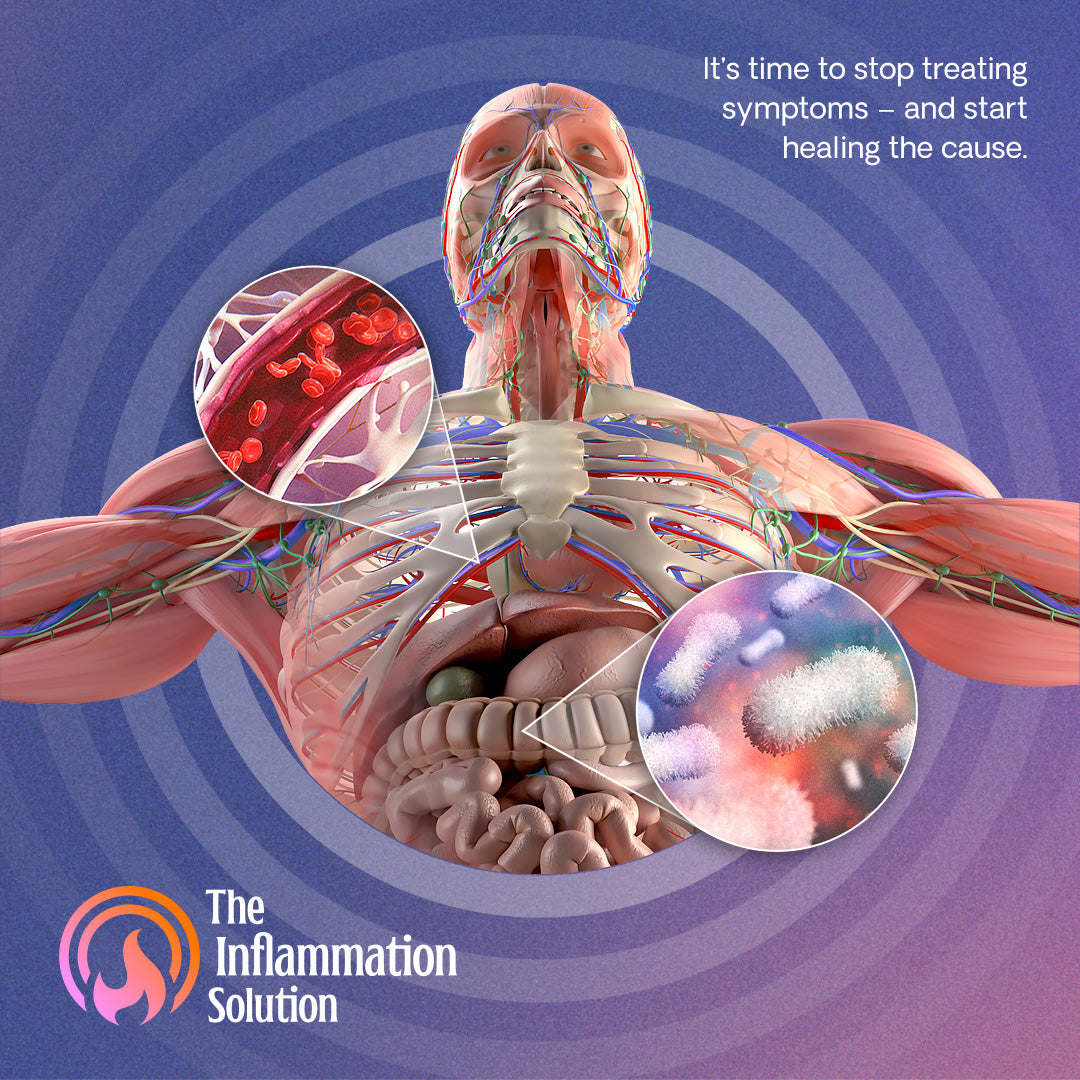

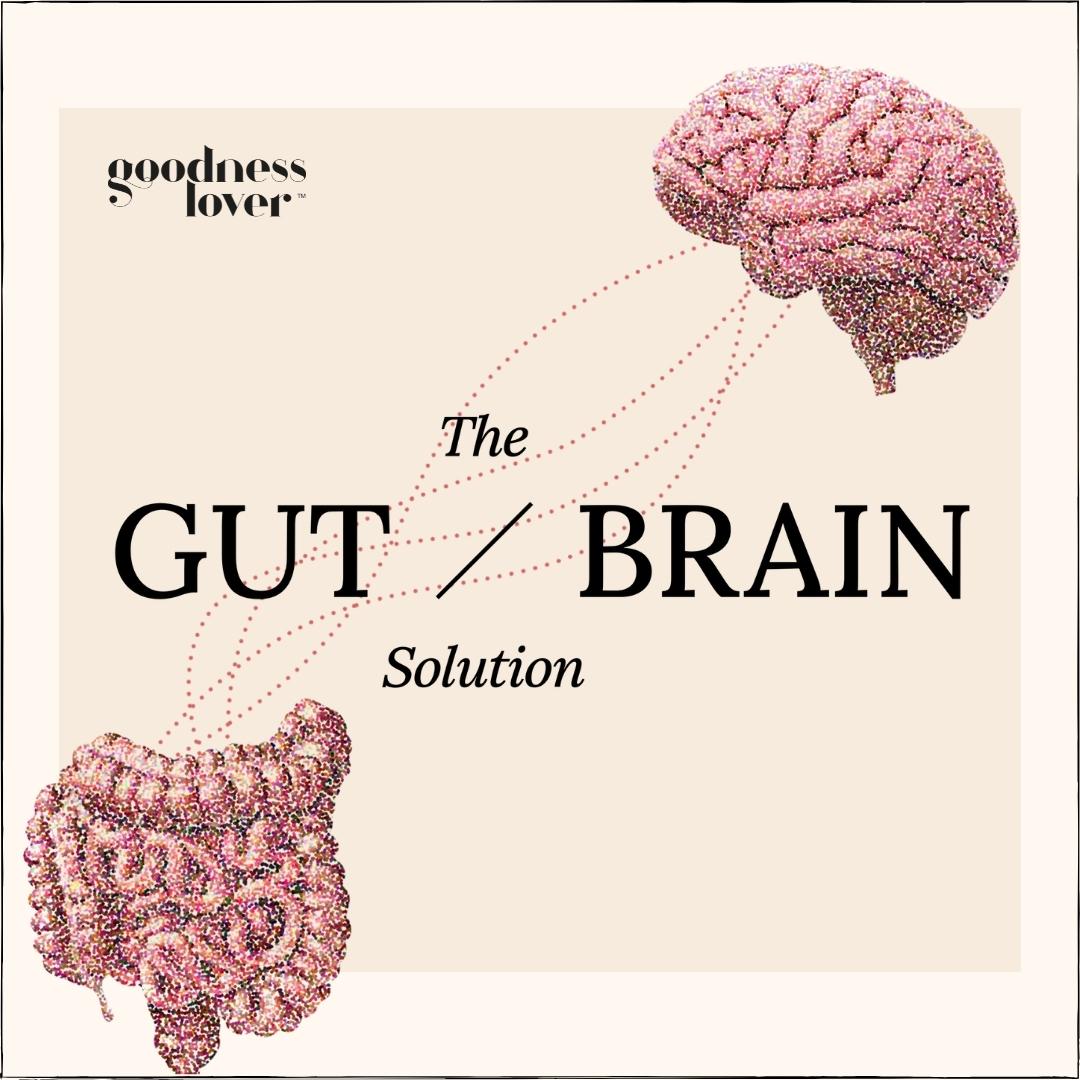


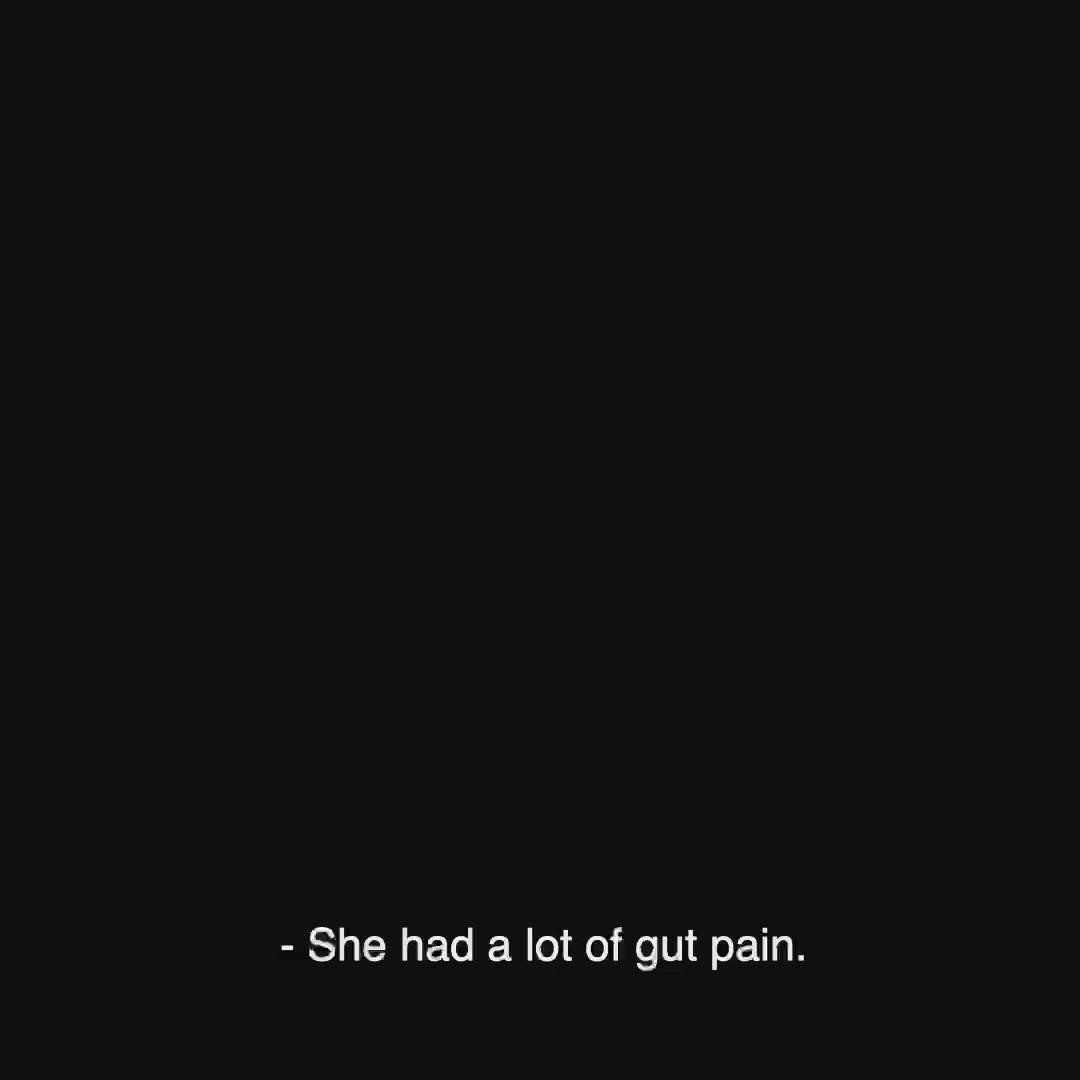
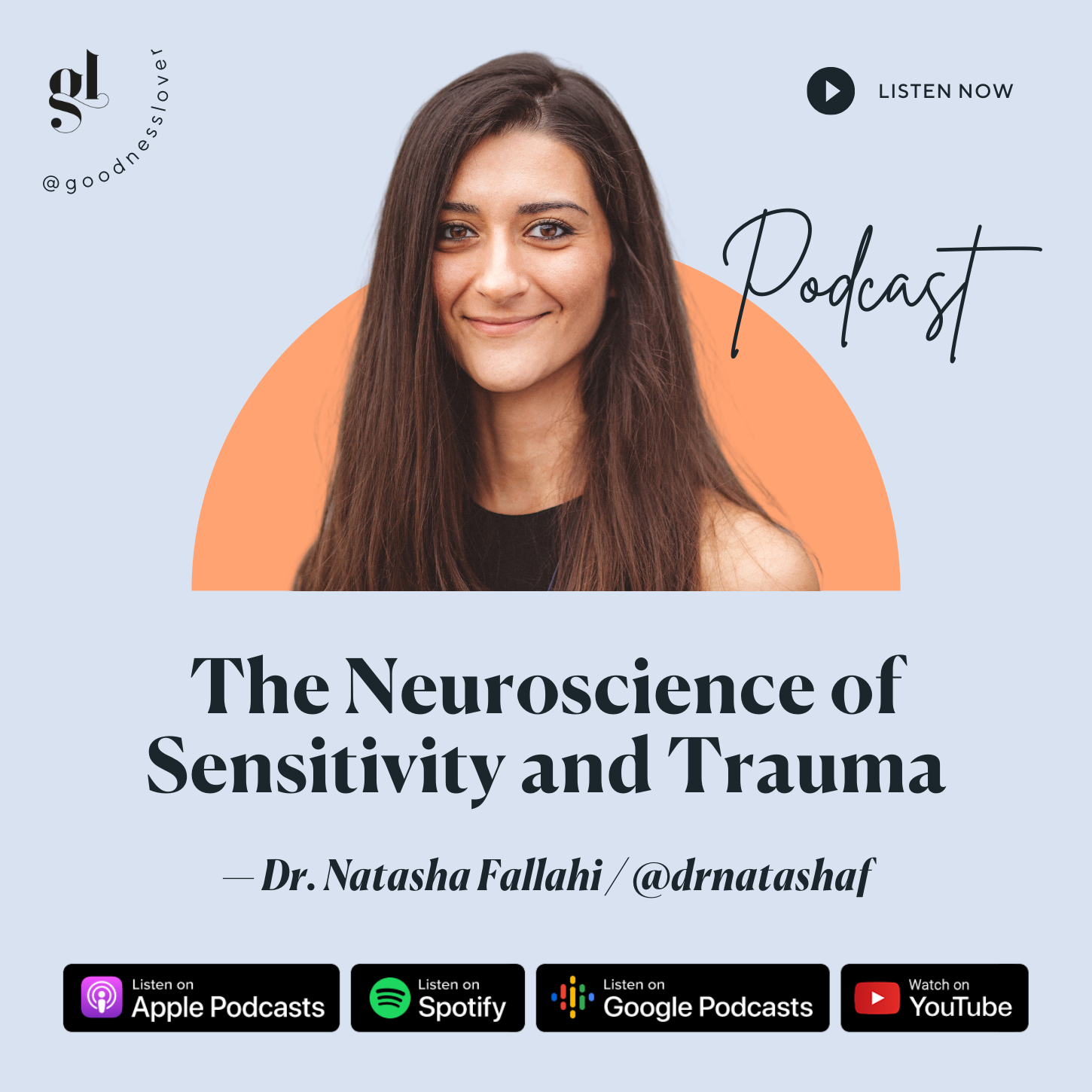
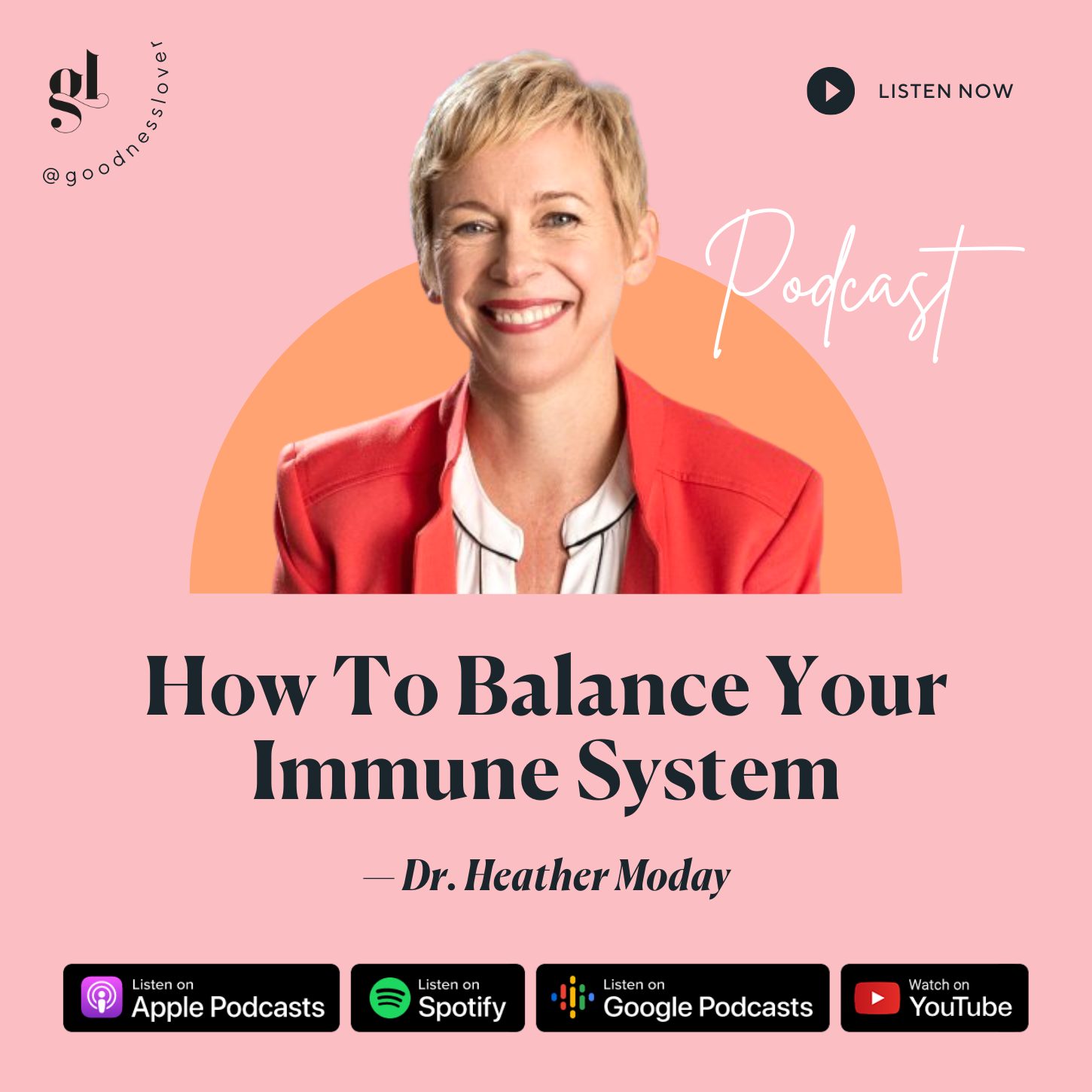

What Do You Think? Comment Below: